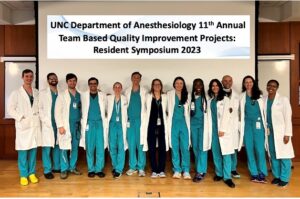On Wednesday, June 7th, the UNC Anesthesiology 11th Annual Resident Team-Based QuaIity Improvement Symposium showcased advanced resident learning and leadership in Patient Safety-Quality Improvement (PSQI)-focused innovation and application to inefficiencies in anesthesiology practice within a multi-hospital system. Fourteen UNC Anesthesiology 2nd-year residents (CA-2s) presented PSQI projects demonstrating how resident-led, team-based PSQI-focused approaches can effectively and measurably improve patient outcomes within a large academic medical center such as UNC Medical Center (UNCMC). 
This year, top presentation/project awards for the 11th Annual Resident Team-Based QuaIity Improvement Symposium included:
First Place: “Cognitive Aids to Improve Postoperative Nausea and Vomiting Prophylaxis” (CA-2 Dr. Ezekiel Egan, CA-2 Dr. Ashley Wicker, CA-1 Dr. Amy Bingham, CA-1 Dr. Kelsey De Silva, Associate Professor Dr. James Krakowski, and Assistant Professor Dr. Elisa Lund).
Second Place: “Reducing Environmental Impact of Inhaled Anesthetics” (CA-2 Dr. Nicole Martin, CA-2 Dr. David Sender, CA-1 Dr. Josh Pyant, CA-1 Dr. Jacqueline Quinn, Assistant Professor Dr. Lindsay Gouker, and Associate Professor Dr. Andrew Lobonc)
Third Place: “Implementing a Post-Anesthesia Care Unit (PACU) Phase II Fast-Track Policy” Dr. CA-2 Jennifer Tripi, CA-2 Dr. Elizabeth Willis, CA-1 Dr. Adrina Skyles, CA-1 Dr. Nicholas Miller, Associate Professor Dr. Sam Blacker, and Associate Professor Dr. Sally Stander.
Each year, UNC Anesthesiology CA-2s are paired with faculty mentors who guide them through developing a project that addresses an intra-departmental inefficiency. PSQI priorities in process or practice or department quality metrics are narrowed to a short list of project options by UNC Anesthesiology PSQI leadership. Once CA-2s are matched with a preferred project area, they lead year-long efforts to develop PSQI approaches via brainstorming sessions and reviewing data with CA-1 and faculty mentor teammates. By the culmination of this year-long foundational educational experience, all teams address their assigned process or practice challenge through developing an evidence-based PSQI intervention or approach with real application to improving outcomes in peri-operative and anesthesia care.
UNC Anesthesiology PSQI Manager Nathan Woody noted: “The two-fold purpose of having our CA-2 residents lead a year-long departmental QI project is to educate them and to allow them real world [PSQI] experience. These projects enable them to effectively improve practices within their training environment, and the vast majority have directly affected efficiencies within UNC Anesthesiology and/or patient outcomes across [UNCMC] via effective interventions. This CA-2 learning experience allows these trainees to utilize what they’ve learned to work through an improvement project and hopefully take what they’ve learned with them once they’re finished their training at UNC.”